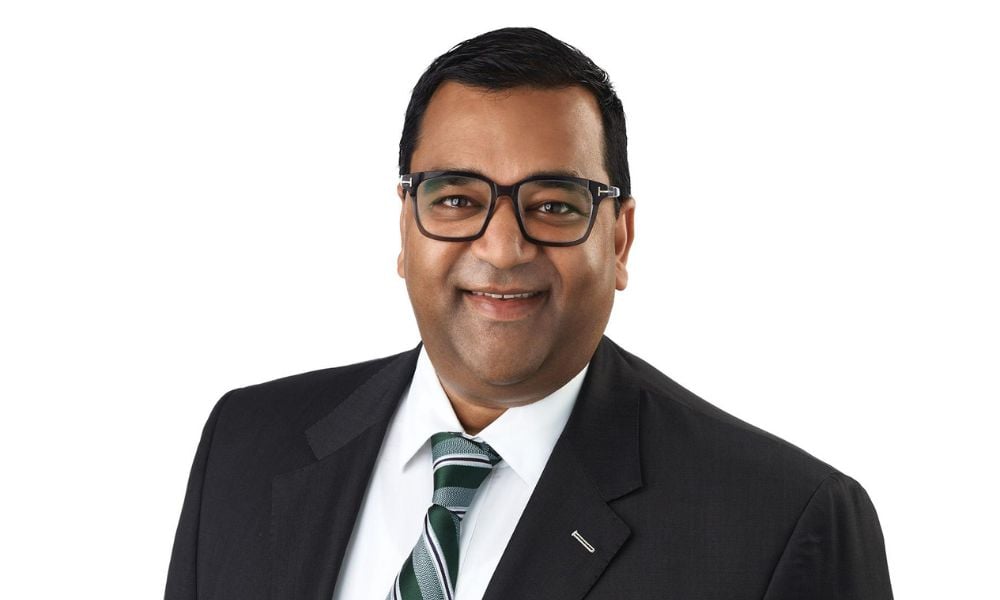
Sinha's clients in crises are often facing unprecedented situations

Lawyers love precedent. From their first day of law school, they learn to look back and analyze how courts have made decisions and apply that approach to the facts.
However, many of Awanish Sinha’s clients find themselves in unprecedented situations.
Sinha co-leads McCarthy Tétrault LLP’s public sector strategy group, which helps clients navigate legal issues at the intersection of politics, public policy and business. He advised Maple Leaf Sports & Entertainment and the Ontario Lottery and Gaming Corporation during the pandemic and helped the Liquor Control Board of Ontario create its cannabis stores.
These entities faced extraordinary circumstances involving political risk, unforeseen circumstances, and a need for transformative strategies.
“I'm trying to push a new frontier of law, a different way of looking at problem-solving in the legal world,” says Sinha.
Like the situations his clients face, Sinha is not typical. He grew up in St. John's, Newfoundland, as part of what he describes as “a vibrant and loving but not massive Indian community.”
He says just telling his story can help improve inclusion in the profession by dispelling the myth that there is one kind of successful lawyer.
“In 2022, you think that there's a specific assumed type of [Bay] Street partner that you need to emulate? Well, I am a hip hop-loving Hindu from Newfoundland, so I guess your plans are out the window,” he quips.
Sinha studied political science at the University of Ottawa in the early 1990s and worked as a parliamentary page. He says that role helped him better understand the “chess matches” occurring behind the scenes when politicians were working to achieve important political goals.
“I was very interested in places where serious political change meant the complete upheaval of legal systems.”
Sinha then studied law at McGill University, which he says was a great time of intellectual exploration.
“Much of law school is the contents inside the box, the laws inside the systems. But the system making, and what happens when systems collide, is also fascinating.”
After graduating, Sinha joined McCarthy Tétrault in Toronto. He says the firm’s culture meant he immediately felt at home.
“There was joie de vivre to what they did, which had not been something you're taught to assume about Big Law.”
Sinha describes a “professional manner of swashbuckling” at the firm that he wanted to support at the outset. “20 years ago, that was the ethos of a place that could have been a lot staider about the way it approached business and markets and what we now call innovation.”
He started out practising commercial, contract, infrastructure, and energy litigation. After building “the good habits and learnings from being a litigator and [practising at] a serious litigation shop,” Sinha says his role grew to become a special advisor for clients in high-stakes circumstances at the intersection of business law and politics.
As his practice morphed into this advisory role, Matthew Peters, who leads the firm’s innovation efforts, approached Sinha about creating a public sector group at the firm.
Along with co-leaders Gillian Kerr, a litigator and Matthew Kelleher, a corporate lawyer, Sinha helped launch the group.
“The public sector group was our way of organizing something we … already had been doing in different ways for a few years and introducing ourselves to the market in that way.”
Pre-pandemic, Sinha’s work with the LCBO involved advising the Crown corporation on the regulatory and commercial structure for the creation of the Ontario Cannabis Store, the largest cannabis purchasing entity in the world.
“It was a great benefit to be able to bring some thinking to the table that was about what's possible, and methodically thinking about regulatory frameworks and what they're supposed to do, rather than just craft the way we've always done it,” says Sinha.
But when the pandemic hit, the public sector group was tested even more to think in unprecedented ways.
At the pandemic's beginning, Sinha’s group helped advise OLG on the immediate shutdown of all casinos and table-gaming facilities in Ontario.
They also acted for MLSE in its regulatory, public health and government negotiation processes for the return to play for the National Hockey League, the National Basketball Association and Major League Soccer in Canada. This work included MLSE’s winning bid to host the 2020 NHL “Playoffs Bubble” in Toronto and the 2021 return from Tampa Bay of the Toronto Raptors for the 2021/2022 season.
“It was an extraordinary legal and professional journey. I feel really blessed to be a part of it … I'm proud to say that there wasn't a single case of COVID from the NHL bubble in Toronto.”
However, his group’s work during the pandemic with the Ontario Chamber of Commerce and the Toronto Regional Board of Trade was perhaps its most complex. Sinha helped these business groups create the “VAX-PASS Tenets,” a set of guidelines to develop community standards for vaccine verification.
“There was no law. There was no legal precedent. And you might remember people were talking about Charter violations or human rights code violations from having vaccine mandates in offices.”
In addition to providing more clarity for businesses on how to approach their return to the office, the guidelines prompted the Ford government to pass legislation.
Most recently, Sinha advised Cadillac Fairview when it had to shut down its mall in Ottawa during the trucker protests.
For Sinha, it was yet another situation where reliance on precedent would not suffice.
“In all these examples, you would have done poorly to try to wish away the novelty of the situation and not face it head on… We've been living in an age of what I call the ‘Great Unprecedented.’ I've been blessed to have a practice that fits with that.”